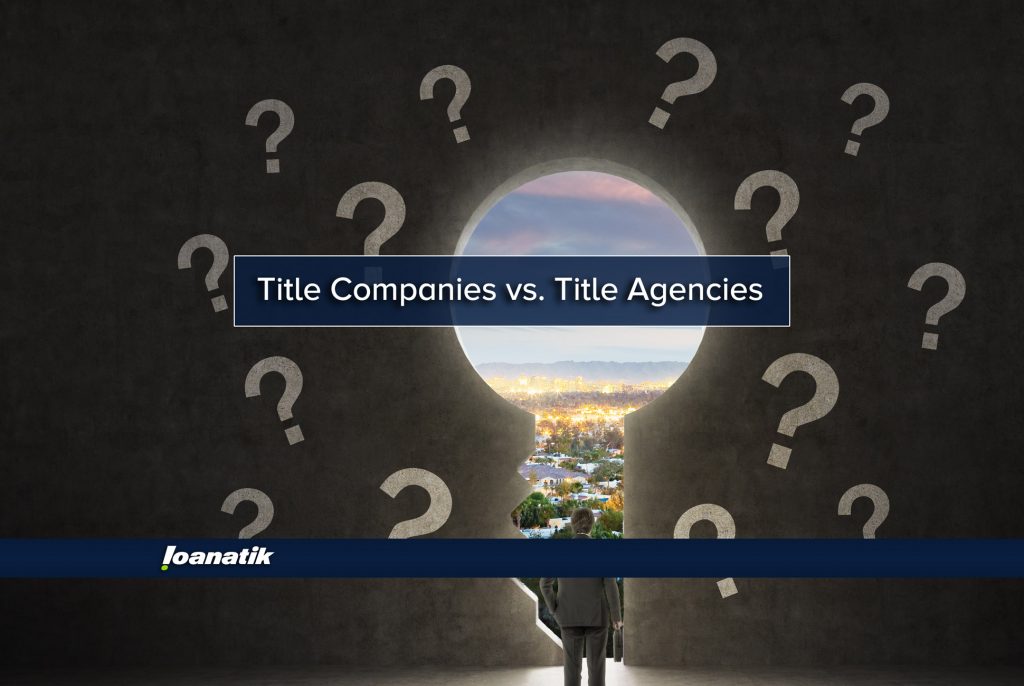What’s the difference between a Title Company and Title Agency?

The process of buying a home culminates in the “closing,” (or “settlement”), which is where papers are signed, checks are exchanged and keys are handed over. If you ever sat through a closing, you know that there is a cast of characters that includes the buyers/sellers and their brokers and lawyers, as well as a person (the settlement agent) in charge of the process. Other participants before or during the closing include the title agency and title company. The assortment of participants can be confusing, so let’s clarify some important roles.
Title Insurance
Title insurance protects the lender, and optionally the home buyer, from defects in the property’s title. See the Loanatik article on title insurance to learn more about owner’s and lender’s title policies. Lenders always require title insurance, whereas buyers can choose whether to purchase it or not (Loanatik advises that buyers always purchase title insurance).
Participants
The participants involved in title insurance are:
- The Title Company: The title company directly underwrites and issues title insurance to purchasers, builders, developers and lenders. There are four major American title companies: Fidelity National Mortgage, First American Corporation, Old Republic National Title Insurance Company, and Steward Title Guaranty Company. All four of these trade on the New York Stock Exchange. There are also several regional companies that also write title insurance policies. The title company might or might not be a participant at a real estate closing.
- The Title Agency: A title agency is a subcontractor that represents the title company in a real estate transaction. A title agency underwrites a title before a title company issues the insurance policy. There are hundreds of small title agencies throughout the U.S., and they will attend the closing in lieu of the title company. Home buyers can choose which title agent or title company they want to use.
- The Settlement Agent: The settlement agent runs the closing process. The settlement agent may be a real estate agent, mortgage broker, homebuilder, lawyer or a bank, or may be the title agent or the title company. Settlement agents ensure that all the correct papers are signed, payments are exchanged and escrow funds are released. They also ensure that the lender’s title policy is executed and offers the homebuyer the option of buying a title policy as well.
As you can see, the title company, title agent and settlement agent may be the same participant, or they may be separate entities.
Independent vs Affiliated Settlement Agents
A settlement agent or title agent may be an independent third party or may be an affiliate of a settlement service provider — a real estate agent, mortgage broker, homebuilder or bank. An affiliate has a business relationship with one or more service providers, meaning that the agent pays a fee to the settlement service provider. The Real Estate Settlement Procedures Act (RESPA) outlaws real estate kickbacks and referral fees, but make no mistake, they still go on. The affiliated agent might pay the kickback in exchange for a referral from a settlement service provider, in order to induce the home buyer to use the agent for settling/closing the transaction. In some cases, the settlement or title agent may be partially owned by the settlement service provider.
An independent title agent/settlement agent is not affiliated with a settlement service provider and does not receive kickbacks or referral fees. Independent agents capture business by virtue of the quality of their work rather than through kickbacks. Consumers usually pay less for the services of an independent agent, because they are not paying the referral fee built into an affiliated agent’s cost structure.
Independent agents don’t participate in one-stop shopping deals or other joint ventures with settlement service providers. Another point in favor of independent title agents is that they make underwriting determinations based on sound principles, undistorted by compensation paid to a referral source. Bear in mind that the kickback recipient does not carry any of the risks associated with a faulty title – that’s the responsibility of the title agent.
As the home buyer, you have the right to demand an independent title agent instead of an affiliate recommended by a settlement service provider. Loanatik never participates in kickback schemes with title or settlement agents, because we value honesty and integrity in all of our dealings.
Closing Protection Letter for Title Insurance
Mortgage lenders like Loanatik strive to provide loans to consumers at the lowest possible interest rates. In order to do so, a good lending company knows how to properly manage its costs and risks. To that end, it is customary for a title agent to provide the lender with a closing protection letter (CPL) when the agent arranges the title insurance. Essentially, the CPL indemnifies the lender in case a title agent makes any errors, or is negligent or engages in fraud. For instance, the CPL would protect the lender if the settlement agent steals loan funds from escrow.
CPLs are now standard forms, but they originated ad hoc in the 1960’s to protect lenders from fraud or mistakes on the part of settlement agents or lawyers contracted by the title agency. Standardized CPLs are available from the American Land Title Association. These letters have been updated to comply with the recent TILA-RESPA regulations. CPLs pertain only to documents that comply with government regulations. They are usually transmitted to lenders at the same time as they receive the Closing Statement from the settlement agent.
If you get a mortgage from Loanatik, you can ask for our recommendations regarding a title or settlement agency is the knowledge that we recommend only on the basis of merit, never for illegal kickbacks or referral fees. You are, of course, free to choose any title agency you like, and we’ll be happy to accommodate you.





COMMENTS